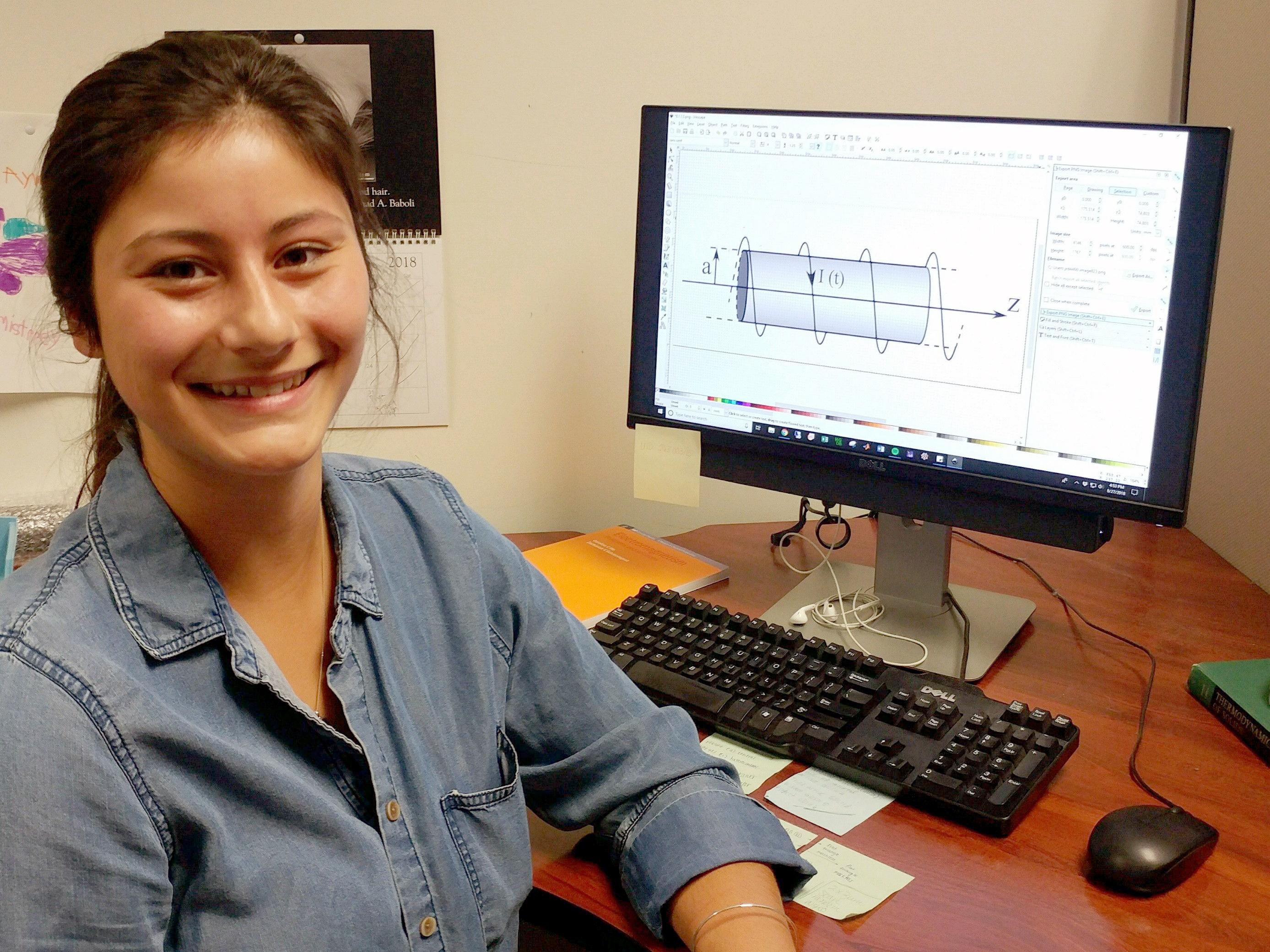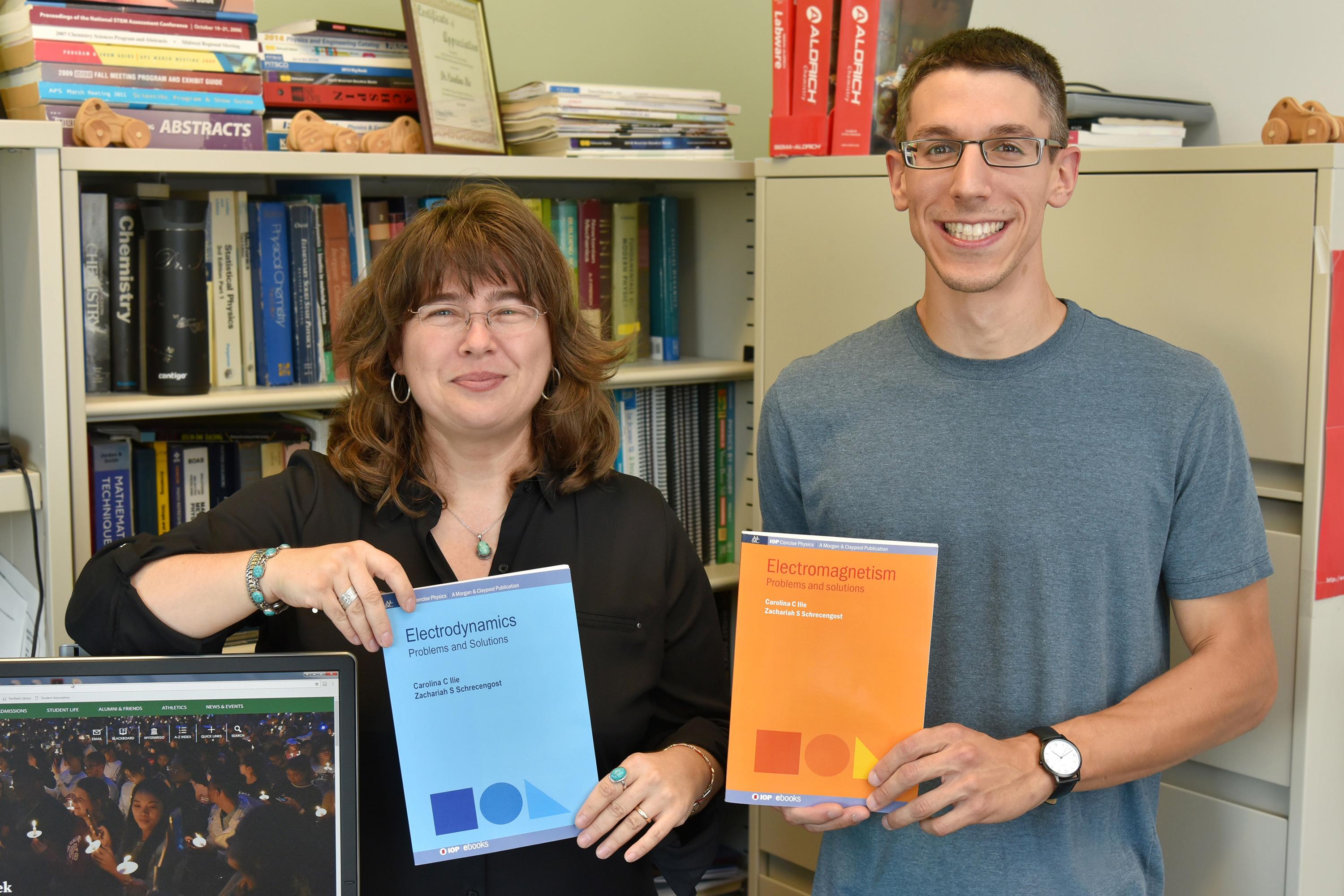Textbook team – SUNY Oswego physics faculty member Carolina Ilie and 2015 graduate Zachariah Schrecengost recently co-authored their second physics text together, "Electrodynamics: Problems and Solutions." Julia D'Rozario (not pictured), a 2016 SUNY Oswego graduate, provided illustrations for that book and its predecessor, "Electromagnetism: Problems and Solutions."
Physics faculty member Carolina Ilie and a former student, 2015 graduate Zachariah Schrecengost, have co-authored their second physics text together, with 2016 alumna Julia D'Rozario again providing illustrations.
"Electrodynamics: Problems and Solutions," published by Morgan & Claypool Publishers in an Institute of Physics Publishing series, continues work from and mirrors the Oswego team’s 2016 publication "Electromagnetism: Problems and Solutions."
"After the success of the first book, we decided to continue with the second book on electrodynamics, a very challenging, highly mathematically involved course," Ilie said.
"The best part of the process was the team," Ilie added. “Zac and I were meeting monthly to exchange our created problems and to check each other's solutions. After that, we were making the drawings and sending them to Julia, who was working on the figures and was getting back to us for feedback. This is how the second book was born!”
The course material -- covering the interaction of electric currents with magnetic fields or with other electric currents -- is so complex that many universities do not offer it until graduate school, focusing more on the electromagnetism portion. Ilie teaching a course in it at Oswego's undergraduate level provided a unique starting point, buttressed by the contributions of her former students.
"The students who are interested in electrodynamics, or who have to take the GRE-Physics exam, or the students who start graduate school and may want to have experience in electrodynamics, they all may benefit from our second book," Ilie noted. "Both books are targeted to advanced undergraduate students and to graduate students who want to practice electrodynamics problems before adventuring into 'Classical Electrodynamics' by John David Jackson, a very rigorous and difficult book adopted by most of the graduate schools.”
Building a team
When she received the opportunity to begin the first book in 2015, Ilie turned to two of her now-former students who could each bring skills that would make the project better for the creative process as well as for readers.
"I thought that the process may be more rewarding if I invited students and alumni to work with me on this project," Ilie said. She reached out to Schrecengost who "accepted with enthusiasm," she said, and "brought to the project both the fresh perspective of a student who has recently studied electrodynamics, as well as the enthusiasm and talent of an alumnus who is a theoretical physics and upper-level mathematics aficionado."
Schrecengost, who studied physics, software engineering and applied mathematics at Oswego and is now pursuing a Ph.D. in physics at Syracuse University, appreciated the opportunity to collaborate with a favorite professor as well as to help current and future students in the field.
"I feel great about my contribution to this project," Schrecengost said. "Electrodynamics is quite a challenging topic and it would be easy for a student to get lost in the complexity. The other resources for this subject seem to be at more of a graduate level, which might be inaccessible to even an advanced undergraduate student -- this book aims to fill that gap."
For the illustrations that would bolster the problems and solutions, Ilie continued working with D'Rozario, a former research assistant who double-majored in physics and cinema and screen studies at Oswego and is currently a microsystems engineering Ph.D. candidate at the Rochester Institute of Technology.
"When asked to be the illustrator, I knew that I would be able to bring a creative angle to the team," said D'Rozario, who created more than 700 illustrations overall for both books. "Often times, I would illustrate several versions of the same figure where Dr. Ilie, Zac and I would then decide which figure displayed the material the best."
Ilie said the three participants enjoyed the process, likening it to the energy involved in solving a new and exciting puzzle.
The process was "a bit like solving New York Times crosswords," Ilie explained. “Sometimes you think of a problem, but when you start solving it, you are not sure how things will develop, and this is especially true in electrodynamics. A very small set of problems can, in fact, be solved."
The team found the process "a bit of a new trailblazer experience," Ilie added. "For many problems, we had to study advanced research articles in electrodynamics and branch out and discuss other problems related to these. Also, the two books are very related to my work in condensed matter physics, especially to the electric transport properties and magnetic properties of materials. So it makes a full circle!"
Working with these former students "brought a fresh energy to the project and the pride of having alumni and students on a rewarding, successful project," Ilie said. "Together, we put SUNY Oswego's name in libraries and bookstores all over the world, from Stanford University and Harvard to Vienna University, France and Japan."
 Illustrating concepts -- Julia D'Rozario, a 2016 SUNY Oswego graduate, provided hundreds of complex illustrations to build the new textbook "Electrodynamics: Problems and Solutions," co-authored by her former physics professor, Carolina Ilie, and 2015 SUNY Oswego alumnus Zachariah Schrecengost.
Illustrating concepts -- Julia D'Rozario, a 2016 SUNY Oswego graduate, provided hundreds of complex illustrations to build the new textbook "Electrodynamics: Problems and Solutions," co-authored by her former physics professor, Carolina Ilie, and 2015 SUNY Oswego alumnus Zachariah Schrecengost.




